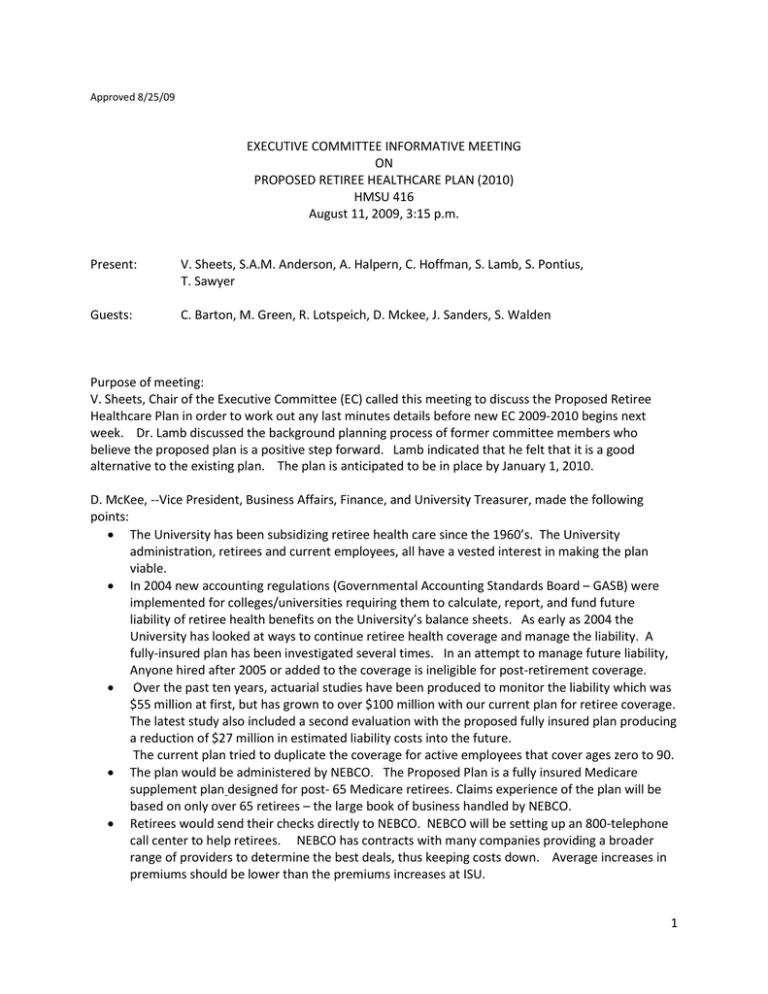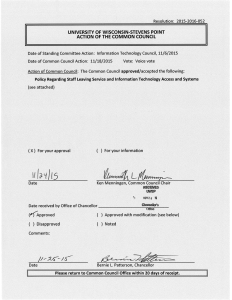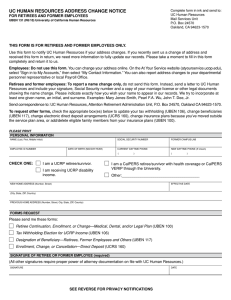EXECUTIVE COMMITTEE INFORMATIVE MEETING ON PROPOSED RETIREE HEALTHCARE PLAN (2010)
advertisement

Approved 8/25/09 EXECUTIVE COMMITTEE INFORMATIVE MEETING ON PROPOSED RETIREE HEALTHCARE PLAN (2010) HMSU 416 August 11, 2009, 3:15 p.m. Present: V. Sheets, S.A.M. Anderson, A. Halpern, C. Hoffman, S. Lamb, S. Pontius, T. Sawyer Guests: C. Barton, M. Green, R. Lotspeich, D. Mckee, J. Sanders, S. Walden Purpose of meeting: V. Sheets, Chair of the Executive Committee (EC) called this meeting to discuss the Proposed Retiree Healthcare Plan in order to work out any last minutes details before new EC 2009-2010 begins next week. Dr. Lamb discussed the background planning process of former committee members who believe the proposed plan is a positive step forward. Lamb indicated that he felt that it is a good alternative to the existing plan. The plan is anticipated to be in place by January 1, 2010. D. McKee, --Vice President, Business Affairs, Finance, and University Treasurer, made the following points: The University has been subsidizing retiree health care since the 1960’s. The University administration, retirees and current employees, all have a vested interest in making the plan viable. In 2004 new accounting regulations (Governmental Accounting Standards Board – GASB) were implemented for colleges/universities requiring them to calculate, report, and fund future liability of retiree health benefits on the University’s balance sheets. As early as 2004 the University has looked at ways to continue retiree health coverage and manage the liability. A fully-insured plan has been investigated several times. In an attempt to manage future liability, Anyone hired after 2005 or added to the coverage is ineligible for post-retirement coverage. Over the past ten years, actuarial studies have been produced to monitor the liability which was $55 million at first, but has grown to over $100 million with our current plan for retiree coverage. The latest study also included a second evaluation with the proposed fully insured plan producing a reduction of $27 million in estimated liability costs into the future. The current plan tried to duplicate the coverage for active employees that cover ages zero to 90. The plan would be administered by NEBCO. The Proposed Plan is a fully insured Medicare supplement plan designed for post- 65 Medicare retirees. Claims experience of the plan will be based on only over 65 retirees – the large book of business handled by NEBCO. Retirees would send their checks directly to NEBCO. NEBCO will be setting up an 800-telephone call center to help retirees. NEBCO has contracts with many companies providing a broader range of providers to determine the best deals, thus keeping costs down. Average increases in premiums should be lower than the premiums increases at ISU. 1 The premium of this plan is $53 per retiree per month. ISU continues to subsidize $215 per month to cover the balance of the costs totaling $268 (dental coverage, prescription drug and medical). The retiree share is approximately 20% of the total with ISU paying the remaining 80%. It is the Universities goal to continue to cover the same percentage of cost of the program. January 1, 2010 would be the effective date for this new plan. Retirees will be required to complete a necessary form and attach a check/money order for the first month’s premium. Sheets asked if retirees need to pay upfront. McKee stated that retirees can pay a year in advance or as they previously paid. NEBCO would also accept electronic withdrawals from anywhere the retiree is located. C. Barton, Director of Compensation/Benefits, Human Resources, discussed why she likes the plan: It enhances our present plan. The University would choose Medicare SUPPLEMENT Plan F which is better than its current benefits ($15 co-pay, an 80-20 plan.) The plan offers emergency care overseas. (pays 50 %. Up to $50,000) NEBCO will be able to list all drugs covered on a web page. Retirees can check their drugs to see which plan, basic or enhanced, will work better for the drugs taken. The enhanced plan costs $22 per month more for each retiree. There are no “donut holes.” There is also a mail order plan for 90-day supplies. Retail Purchase limited to 35 days. An optional enhanced prescription plan will be available for an additional $22. Spousal medical coverage will continue as before—spouses below 65 will be continued with ISU as before. Spouses will be offered the NEBCO plan at age 65.. Out of pocket maximum rate is $2,500. Further Comments: J. Sanders stated that he was chair of the former committee in fall/spring of 2008. The committee at that time was asked to bring their work to conclusion. He believes that the proposed plan will reduce post- retirement liability. He stated that he felt that everyone on the committee believed that this is the best way to go. M. Green stated that committee members agreed that it was a win-win situation for both the University and retiree. McKee mentioned that she has talked to several retirees Sheets stated that his recollection was that Frank Bell thought the plan is a good option. QUESTION ABOUT EFFECT ON VEBA: McKee stated that the University needs to continue the VEBA Trust. In 1998 when the VEBA Trust was established the estimated liability for post retirement benefits was approximately $55 million. It was anticipated the liability would be fully funded after 10 years. She noted that much has happened over the last 12 years relative to the national economy and the cost of health care. As of July 31, 2009, the VEBA had a $48 million value versus the outstanding liability of $103 million. She hopes to get the VEBA trust more in line with its projected liability. The move to Medicare Supplement Plan F will reduce our longterm financial obligation by $27 million. AT the present time the Trust in intact and untouchable. It will not be used at this time. The Trust is structured for health/life expenses only and cannot be used for any other purpose. Question about effect of the national healthcare debate and changes which may result: It is hard to predict what might happen. Would there be any way to determine how robust it would be in terms of a national system? Concern expressed whether national changes might run up cost in an effort to insure millions. McKee stated that it is impossible to answer this question at the 2 present time. C. Barton stated that the University does not deal with insurance companies below an A rating. M. Green stated that there is no way the national healthcare system can continue the way it is going. No one can anticipate what might happen. McKee announced that there are four sessions planned for September 21 and 22 that will help people understand and ask questions about the plan. NEBCO people will attend, John Boss from AON (our benefit consultant) Frank Bell, Bob Schafer, and others will be invited. She further stated that she believes we are fortunate to have some of our liabilities funded. We do not know what the federal plan will be but it is unlikely that employers will be absolved of responsibility for retiree health coverage they may have taken on. Sheets asked if individual insureds will decide whether they want coverage. He raised the concern that some might be left out and not covered. McKee stated that we are talking about 1108 retirees and that Harriett Kelley, Senior Benefits Assoc. in Human Resources, has established very good relationships with retirees over the years and will make sure that all are contacted. S. Lamb asked what effect discoveries of new diseases and new needs would have on coverage. Will our committee still have input? McKee stated that the new committee would include the of FEBC, people from faculty, support staff, EAP, etc. as well as Frank Bell and Bob Schafer, who have been recommended by Faculty Senate to represent our retirees. C. Barton noted that a retiree must have been covered at least 20 years and be at least 60. Those who do not qualify will be able to "BUY IN" for approximately $240 month and also cover spouses (under 65) for an additional premium. The single plan would cost (e.g. spouse) $111$143 for those not yet 65. Suggestion made that former committee members be consulted and provided as much information about the Plan as possible before it becomes final. It is desirable to have more feedback from former committee members to see their reaction to the new plan. R. Lotspeich stated that it might be a good idea to have someone from McKee’s office follow up on the nature of the debate. McKee stated that she can do that and emphasized again that everything will be out in the open. She further stated that Board of Trustees members have been informed about the proposed plan. V. Sheets stated that he appreciated the informative discussion and attendance of all at the meeting. Meeting ended at 4:20 p.m. 3



